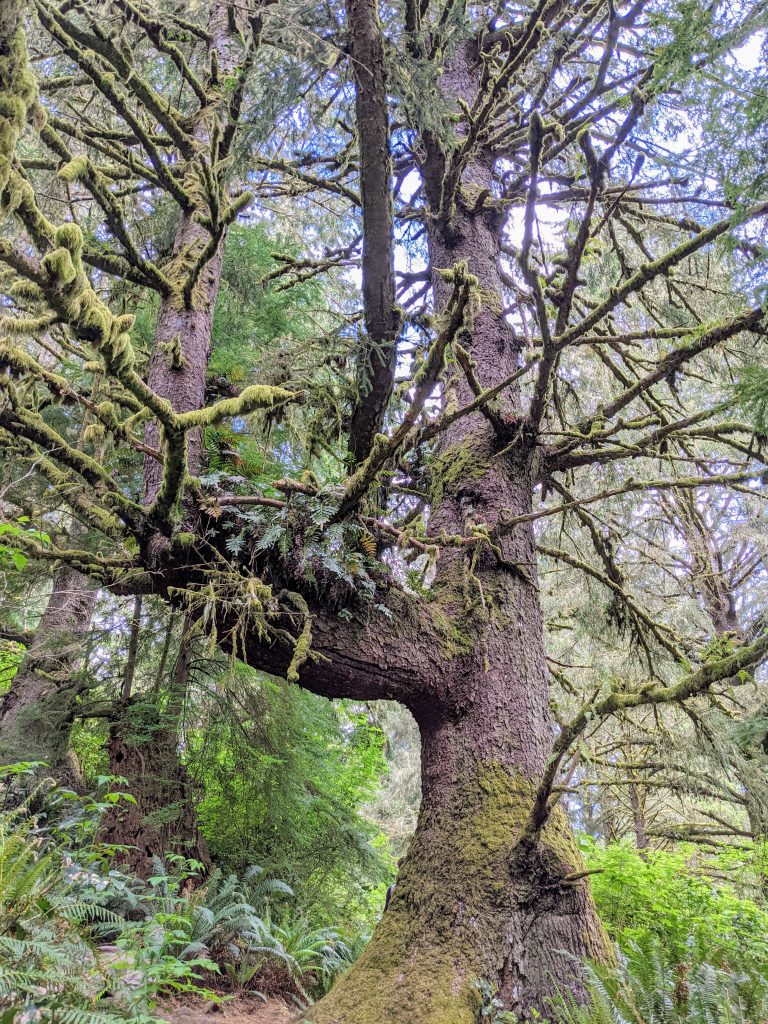Last month, I flew to Oregon to visit my daughter. Our mission, in part, was to find her a wedding dress, but because neither of us is much of a shopper, we spent more time blissfully hiking than pawing through racks of sequins and tulle.
One of our best hikes took us through Cape Disappointment State Park in Washington. The trees were cathedral-size, the lush ferns were waist-high, and every rock and branch was softened by moss. Hiking is always a walking meditation for me, and this was no different. Maybe it was the name of this place–Cape Disappointment!–but the darkest, most closeted rooms in my brain were suddenly lit up and I found myself facing the question I’d been avoiding: Should I give up on the novel I’m writing?
The thing about writing books is that they’re a bit like putting together Ikea shelves, as debut novelist Virginia Hume noted when we appeared on a panel together at the recent Newburyport Literary Festival: even with a plan in front of you, you don’t know if a particular piece will hold together until you actually build it. This can be a frustrating, time-consuming process.
In a span of fifteen years, I published a memoir and six novels of contemporary fiction (along with many other ghostwritten books). Then I had the bright idea to spend four years researching and writing an historical novel that still hasn’t sold.
While I wait (im)patiently for the right editor for that manuscript, I’m working on a new book. This one is a novel of psychological suspense set in Spain. I love it, but when I showed it to my agent, she sent me back a detailed editorial letter that basically said, “Do it again.” (Her notes were spot on, btw.)
Hiking in Oregon, I pondered this novel and what it might take to whip it into shape. It seemed fitting to be on Cape Disappointment, pushing my old mom legs to keep pace with my daughter’s ultra marathoner’s muscular limbs, wondering if I should give up.
A Quick History and Geography Lesson
Cape Disappointment is a headland located at the southwest corner of Washington. Here, the powerful Columbia River meets the Pacific Ocean. The enormous amount of sediment carried by the river creates the Columbia River Bar, one of the world’s most dangerous maritime channels. Since 1792, the bar has been responsible for sinking some 2,000 ships.
The first non-native person to discover the Cape was Spanish explorer Bruno de Heceta in 1775. In 1788, the English Captain John Meares tried to find the Columbia, but because he thought he’d only found a bay and not the river’s mouth, he dubbed the area Cape Disappointment. A few years later, Lewis and Clark navigated their way here by land.
Bottom Line: When Should You Quit on a Novel?
How do you know when to quit on a novel?
I’ve written various manuscripts that have ended up in drawers or filing cabinets. I’ve even written books that I literally threw into fireplaces. It isn’t ever doubts about myself or the fickle publishing marketplace that lead me to give up on a particular book project. Rather, it’s a lack of interest. I get bored.
So, when do you quit on a book?
Here’s the simple answer: When you can’t stomach another revision or have an idea for a better book.
Ignore the market. Follow your own vision and go where your passion leads you.
On Cape Disappointment, I admired the view and thought about this new book of mine, and found myself eager to get back to it as I descended the trail. Always a good sign.


4 Comments
I look forward to reading it! I love the way you write!
Patti, you’re the best. I miss you. How is it that we never see each other? I hope all is well with you and yours.
Holly I just read your Cape Dissapointment article. I would be dissapointed if you gave up on your new novel whatever that one is. I still remember Chance Harbor and some of your other early books. Of course I love your writing and just recently realized I haven’t seen any new books by you. This is just to let you know I haven’t quit on you and miss you
Carol, you’re so sweet to stop by my blog. I miss you, too, and I’m so glad you haven’t given up on me! This is the toughest lesson for most writers: you are a writer if you’re writing, even if you’re not publishing anything at the moment. Some books just take longer than others. Patience is everything! Believe me, I’ll let you know when the next one comes out–you’ve always been there for me, and I really appreciate your support.